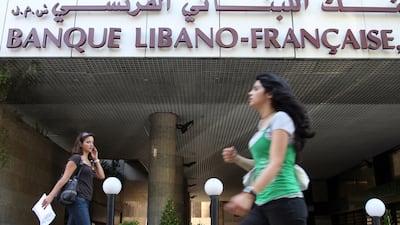A doctor has won his court case to release $4.2 million trapped in a bank in Lebanon.
Dr George Bitar, a dual British-Syrian citizen who works as a consultant radiologist in London, had deposited millions in the Banque Libano-Francaise on the understanding he would be able to access the account from the UK.
However, after the 2019 economic crisis in Lebanon, the bank opted to limit international transfers in US dollars.
Sitting at London’s High Court, Mr Justice Kerr ruled in favour of Dr Bitar and ordered the bank to pay him.
Representatives of Libano-Francaise had conceded it was entitled to pay him, but only in Lebanese pounds or in US dollars that were exchangeable at only about 15 per cent of their normal market value.
Mr Bitar and his family started saving with subsidiaries of the bank in Paris and Geneva in 2010.
The court heard that from 2012 to 2014 the bank sent marketing communications to the doctor, encouraging him to deposit more money in the account.
“In 2014, it is common ground that the bank was interested in attracting deposits from outside Lebanon in foreign currencies, particularly US dollars," Mr Kerr said.
“Many transactions of substance in Lebanon, such as buying a house, are done in US dollars. The bank's website at the time included a section dedicated to the expatriate market, the allure of favourable interest rates and the availability of accounts denominated in non-Lebanese currencies.
“At trial, the bank emphasised the Lebanese diaspora and the importance of remittances from outside Lebanon to relatives at home, suggesting the flow of funds would be mainly inwards not outwards. I agree that the bank was keen on inward rather than outward flows of US dollars, but I accept the claimant's point that the website entries said nothing about restrictions on withdrawal; and that depositors generally expect to be able to withdraw money, as well as deposit it.”
Political unrest in Lebanon triggered an economic crisis in 2019, as a result the bank made an internal decision to impose restrictions on withdrawals.
The court heard the bank did not consider it was “contractually obliged” to effect US-dollar transfers outside Lebanon, despite having “regularly done so” previously.
“The bank knew in 2014 that the [doctor's] family had links to its associates in France and Switzerland, operated internationally and led a cosmopolitan life, with residences in several countries other than Lebanon,” the judge said.
“It was part and parcel of the arrangement that money in US dollars could flow out of, as well as into, the joint account. This was not a case where the purpose of the account was to receive remittances from abroad to family members within Lebanon.
“The account documents confirmed that and provided estimated flow rates in and out of the account."
Mr Justice Kerr added that the bank’s marketing had bordered on “misleading to the expatriate customers it sought to attract” because deposits could have, and in this case did, become trapped in Lebanon at the will of Libano-Francaise.
“A bank cannot bind its customer to future customs of which the customer knows nothing," he said. "It is wholly unrealistic to contend that the bank's international transfer obligation disappeared on November 3, 2019 because the bank on that date made an internal decision that it should disappear.
“It was then said, implausibly, that it was for the bank to decide how to give the customer the bad news afterwards. I reject both suggestions.
“For those reasons, the claim succeeds," the judge said. "The bank is obliged to transfer the credit balance in the account, in US dollars, to the claimant's account in London.”
Since the financial crisis began, banks have imposed draconian controls on withdrawals and transfers in dollars, freezing some accounts and leaving depositors able to access only a fraction of their savings in Lebanese pounds, which have lost more than 90 per cent of their value.
In the absence of any law on capital control, depositors have contested the legality of these informal restrictions before foreign and local courts in a bid to unlock their savings.
Cases have also been heard in France and the US.
In December 2021, a French court ordered Lebanese bank, Saradar, to pay $2.8 million to a client living in France. In March last year, a UK court in London ordered two major Lebanese banks — SGBL and Bank Audi — to pay $4 million to a depositor.


